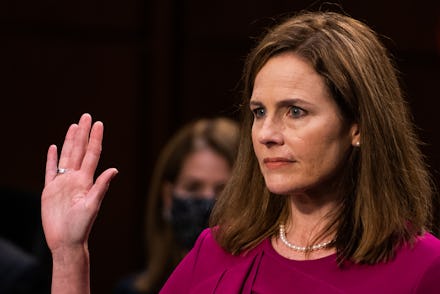With Justice Barrett on the bench, SCOTUS just issued its first anti-abortion ruling

This week, the Supreme Court issued its first abortion related-ruling since Justice Amy Coney Barrett joined its ranks in October. In a ruling issued Tuesday, the court found that patients seeking medication abortions must pick up the pills in person, which advocates argue will prevent patients from accessing the medication — and thus, abortion care — at all.
The court's majority ruling reinstates a Food and Drug Administration (FDA) rule that had, until July, prevented mailing the medication. The July ruling by a lower court federal judge found that amid the COVID-19 pandemic, patients should not have to travel long distances to access medication or be required to pick up medications in person.
Writing on behalf of the majority, Chief Justice John Roberts said that it was unclear whether it was within the court's reach to comment on FDA rules and regulations, and that the issue of medication abortion should be left to what he called "politically accountable entities" with the background and knowledge needed to comment on health care issues. Advocates argue that the majority ruling sidesteps the fact that forcing patients to travel and seek medication abortion pills in person essentially functions as an abortion restriction.
Justice Sonia Sotomayor disagreed with the majority opinion, writing that the rule reversal will pose an "undue burden" on accessing abortion, which the landmark case Roe v. Wade is supposed to protect against. Based on her dissent, which was joined by Justice Elena Kagan, it seems that Sotomayor also disagreed with the justification that the judicial system should not comment on health care matters, as Roberts claimed. "Of the over 20,000 FDA-approved drugs, mifepristone is the only one that the FDA requires to be picked up in person for patients to take at home," Sotomayor wrote. "The FDA's policy imposes an unnecessary, unjustifiable, irrational, and undue burden on women seeking an abortion during the current pandemic."
Advocates for abortion access, like the women of color-led abortion justice organization All* Above All, claim that the ruling will disproportionately harm abortion patients who are already burdened by the coronavirus pandemic. "This [Supreme Court] ruling to restrict telehealth options for medication abortion care will fall hardest on people of color, people who live in rural areas, and those working to make ends meet," the organization wrote on Twitter.
In fact, most people who seek abortion care are already parents, suffer from lower incomes, and face a maze of other challenges produced by racist and classist systems that result in health care inequities. Though the court's majority opinion appears as if it offers concern for the health of abortion patients, ReproAction, a reproductive justice organization, said that the ruling is instead a practice in usurping patient's ability to make decisions for themselves.
"In the same night, SCOTUS decided to execute a mentally ill woman and reinstate unnecessary abortion restrictions," the organization wrote in a tweet, alluding to the federal execution of Lisa Montgomery. "There is nothing 'pro-life' about these actions, advanced by a court hand-picked by conservatives allegedly to protect life. That's a lie: It's about power and control."